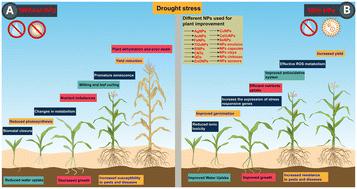当前位置:
X-MOL 学术
›
Environ. Sci.: Nano
›
论文详情
Our official English website, www.x-mol.net, welcomes your feedback! (Note: you will need to create a separate account there.)
Harnessing nanobiotechnology for drought stress: transforming agriculture's future; what, why and how?
Environmental Science: Nano ( IF 5.8 ) Pub Date : 2024-06-18 , DOI: 10.1039/d4en00112e Shahid Ullah Khan 1, 2 , Muhammad Sirab Khan 3 , Hui Wang 1 , Mingchao Qian 1 , Talha Javed 4 , Shah Fahad 5, 6 , Kun Lu 1, 2
Environmental Science: Nano ( IF 5.8 ) Pub Date : 2024-06-18 , DOI: 10.1039/d4en00112e Shahid Ullah Khan 1, 2 , Muhammad Sirab Khan 3 , Hui Wang 1 , Mingchao Qian 1 , Talha Javed 4 , Shah Fahad 5, 6 , Kun Lu 1, 2
Affiliation

|
Nanobiotechnology has received tremendous attention in recent years owing to its wide range of applications in various fields. The growing problem of drought stress (DS) seriously threatens the long-term maintenance of global crop yields and food security. Nanoparticles (NPs) have been proposed as a promising method for improving crop yield in the context of ongoing climate change and increasing drought severity. DS adversely affects various aspects of plant growth and physiological and metabolic processes. Additionally, DS disrupts cellular membranes, limits the uptake of nutrients and water, impairs the efficiency of the photosynthetic system, and interferes with antioxidant activity. NPs ensure the integrity of cellular membranes, regulate water balance, and improve the absorption of nutrients and water, thereby significantly enhancing plant growth under water-deficit conditions. This review addresses the involvement of several metal-based nanoparticles in reducing drought stress in plants. Additionally, we identified several areas of research that require further investigation. Furthermore, this review focuses on providing a comprehensive, well-elaborated, and updated view of what is currently being investigated in smart agriculture using nanobiotechnology. In addition, we strive to compile all the most recent investigations on the applications of NPs and the beauty of the Nobel Prize-winning genome editing technique CRISPR/Cas and nanobiotechnology: two-in-one system in drought stress.
中文翻译:

利用纳米生物技术应对干旱胁迫:改变农业的未来;什么、为什么以及如何?
近年来,纳米生物技术因其在各个领域的广泛应用而受到极大的关注。日益严重的干旱胁迫(DS)问题严重威胁着全球作物产量和粮食安全的长期维持。在持续的气候变化和日益严重的干旱的背景下,纳米颗粒(NP)被认为是一种有前途的提高作物产量的方法。 DS 对植物生长以及生理和代谢过程的各个方面产生不利影响。此外,DS 会破坏细胞膜,限制营养物质和水的吸收,损害光合作用系统的效率,并干扰抗氧化活性。纳米粒子可确保细胞膜的完整性,调节水平衡,改善养分和水的吸收,从而显着促进缺水条件下的植物生长。本综述讨论了几种金属纳米颗粒在减少植物干旱胁迫中的作用。此外,我们还确定了几个需要进一步调查的研究领域。此外,本综述的重点是对目前利用纳米生物技术在智能农业中进行的研究提供全面、详尽和最新的观点。此外,我们努力汇编所有关于纳米粒子应用的最新研究以及诺贝尔奖获得者基因组编辑技术 CRISPR/Cas 和纳米生物技术的魅力:干旱胁迫中的二合一系统。
更新日期:2024-06-18
中文翻译:

利用纳米生物技术应对干旱胁迫:改变农业的未来;什么、为什么以及如何?
近年来,纳米生物技术因其在各个领域的广泛应用而受到极大的关注。日益严重的干旱胁迫(DS)问题严重威胁着全球作物产量和粮食安全的长期维持。在持续的气候变化和日益严重的干旱的背景下,纳米颗粒(NP)被认为是一种有前途的提高作物产量的方法。 DS 对植物生长以及生理和代谢过程的各个方面产生不利影响。此外,DS 会破坏细胞膜,限制营养物质和水的吸收,损害光合作用系统的效率,并干扰抗氧化活性。纳米粒子可确保细胞膜的完整性,调节水平衡,改善养分和水的吸收,从而显着促进缺水条件下的植物生长。本综述讨论了几种金属纳米颗粒在减少植物干旱胁迫中的作用。此外,我们还确定了几个需要进一步调查的研究领域。此外,本综述的重点是对目前利用纳米生物技术在智能农业中进行的研究提供全面、详尽和最新的观点。此外,我们努力汇编所有关于纳米粒子应用的最新研究以及诺贝尔奖获得者基因组编辑技术 CRISPR/Cas 和纳米生物技术的魅力:干旱胁迫中的二合一系统。
















































 京公网安备 11010802027423号
京公网安备 11010802027423号